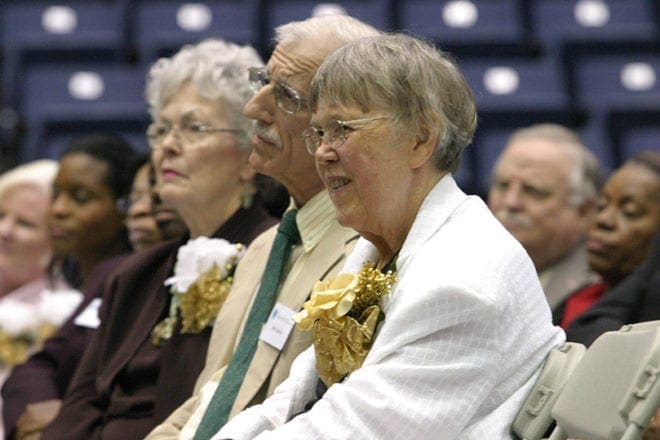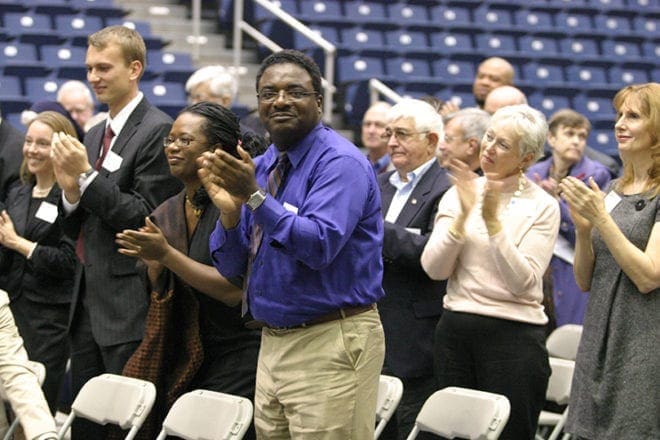Dominican Sister Marie Sullivan has spent 50 years of her life serving individuals and families in crisis in Atlanta and Kansas City, Mo. Photo By Michael Alexander
Atlanta
Those in crisis find Sister Marie at their side
By ANDREW NELSON, Staff Writer | Published November 12, 2009
If you want to know anything about Dominican Sister Marie Sullivan know this: On the afternoon civic leaders lauded her, she spent the morning with people who are homeless, linking them with employment, food and medical programs to help lift them up.
Fifty years of service to men, women and children who risk having their power cut off, face joblessness or going hungry were celebrated as Sister Marie steps back from the human services agency named for her in a poverty-ridden neighborhood.
Atlanta Mayor Shirley Franklin called Sister Marie a “moral voice” for people in need.
“I don’t think I have ever heard you use the word homeless. You talk about people in need, but you don’t label them,” said Franklin at a tribute for Sister Marie at Georgia State University on Oct. 25. “We don’t need labels. We just need to look out for each other.”

(Front to back) Dominican Sister Marie Sullivan, Nick Danna, executive director of the Living Room, and Jane Gunter, director of Family Life Ministries, Inc., listen as Shirley Franklin, Mayor of Atlanta, delivers the keynote address. Photo By Michael Alexander
Words of praise were showered on the diminutive Dominican with wire-rimmed glasses. Sister Marie had an oversized yellow flower pinned to the lapel of her white jacket. She greeted everyone as they stepped away from the podium with a bear hug. At the ceremony, she received Atlanta’s Phoenix Award, among other accolades.
Father John Adamski, pastor of Our Lady of Lourdes Church, told the crowd that Sister Marie always points out that it is the people she serves who are important, not any of the awards she receives.
“In my mind, Sister Marie preaches the Gospel at all times, but very quietly,” he said.
Sister Marie didn’t say a lot that day, but challenged people.
“People created the will to go to the moon and we went there. Can we as a community create the will to get rid of poverty starting in our state?” she asked.
“A Hand Up, Not A Hand Out”
Marie Sullivan’s journey to the neighborhood around Dill Avenue, south of Turner Field, started some 50 years ago when she made her vows as a Sinsinawa Dominican sister. Her attraction to life as a sister was encouraged both in the “Irish ghetto” where she grew up and by her Irish immigrant parents. In her family, where she was the youngest with two older brothers, faith was emphasized.
In 1951, she took her vows. Sister Marie expected to be a schoolteacher, like the Dominican sisters who taught her at Catholic school on Chicago’s southside. But Sister Marie said she learned after teaching for several years that families needed to learn life skills and needed empowerment to break a cycle of poverty. A master’s degree in social work soon followed, making her one of the first in her religious community to earn an advanced degree.
She put her new skills to work in Kansas City, Mo., serving as a day care coordinator serving 500 children and knitting together the efforts of area churches to combat homelessness.
Bill Bolling, founder of the Atlanta Community Food Bank, traveled to Kansas City in the early 1980s. He said that others in Atlanta had heard of Sister Marie’s work and encouraged him to recruit her to help organize similar emergency assistance programs here.
“She did come to Atlanta. And the rest is history,” Bolling said.
She became a leader in the nonprofit community, he said. “We’d look at this quiet Sister Marie to see if she had any ideas. As always, her ideas were ahead of her time.”
She headed up the Christian Council of Metropolitan Atlanta, helping to better coordinate the different church efforts. Through her efforts, several coalitions and organizations took shape, from Buckhead Christian Ministry to the Achor Center, which helps women and children.
Eventually Sister Marie set out to start a new agency to attack the root causes that put people into the streets. (The agency was named in Sullivan’s honor in 1994.) In 1986, she started a computerized database so social service agencies could better work together.
Her inspiration is Catholic social teaching. She boils it down to “a decent house, a decent job, food.”
This agency, now known as the Sullivan Center, is located in the Capitol View neighborhood in southwest Atlanta where more than 20 percent of the residents live in poverty. The center worked from Sister Marie’s motto, “a hand up, not a hand out.” She implemented an approach that required people to attend classes before receiving assistance.
“One of my big things is not to take the responsibility from the individual, but help them see the problem,” said Sister Marie, who is 75. “I say to people, I will help you. I won’t walk in front of you and I won’t walk behind you, I will stand next to you for you to be able to do it yourself. It is all self-sufficiency we are trying to do.”
If a family needs money to cover rent payments, the father or mother has to attend a financial literacy class. If a person wants help to find a job, they meet with a career coach. If food is needed, families must attend a class about nutrition.
“Our mission is to help people with dignity who are in crisis,” said Sister Marie.
In the past 25 years, Sister Marie and her center assisted 33,000 families with financial aid, 230 children got school supplies during a Christmas program, and 329 people found jobs paying above the minimum wage, plus thousands more, according to the Sullivan Center.
Kimberly Campbell was laid off in 2009 after close to 10 years at a good paying job in the telecommunications industry. She found herself at the Sullivan Center looking for help. She has since landed on her feet and volunteers there now. “They are very, very giving. They help everyone in need.”
“It’s God’s Work, Not My Work”
The needs of the people who line up outside the agency’s door never end. But Sister Marie said that doesn’t discourage her anymore.
“Like everyone else, I have down times every so often. But one of the principles I use is, it’s God’s work, not my work. If it’s not going to work, I can’t fight God. If it is going to work, he is going to take care of it.”

Kenneth Capers, left center, joins the audience in giving Sister Marie Sullivan a standing ovation during her tribute event at the Georgia State University Arena, Atlanta. Capers was a Sullivan Center client in April of 2006. Today he is an English professor at Morehouse College and Atlanta Metro Technical College. Photo By Michael Alexander
Sister Marie said her life’s work has always been one where she learns from people.
“What I’ve learned is that many people have a great faith. You and I couldn’t survive on the streets. I don’t know if I could have lived through some of the problems they have to live with,” she said.
As the Sullivan Center carries on without her daily presence—although by the looks of her cluttered office, she’ll be there awhile—Sister Marie isn’t retiring. She is turning her attention to organic gardening. Behind the Sullivan Center is a large yard with some 40 raised gardening beds that she want to make more of a neighborhood attraction. The goal is to expand the program and teach more people about organic gardening to improve people’s diets as well as sell some to make a little money.